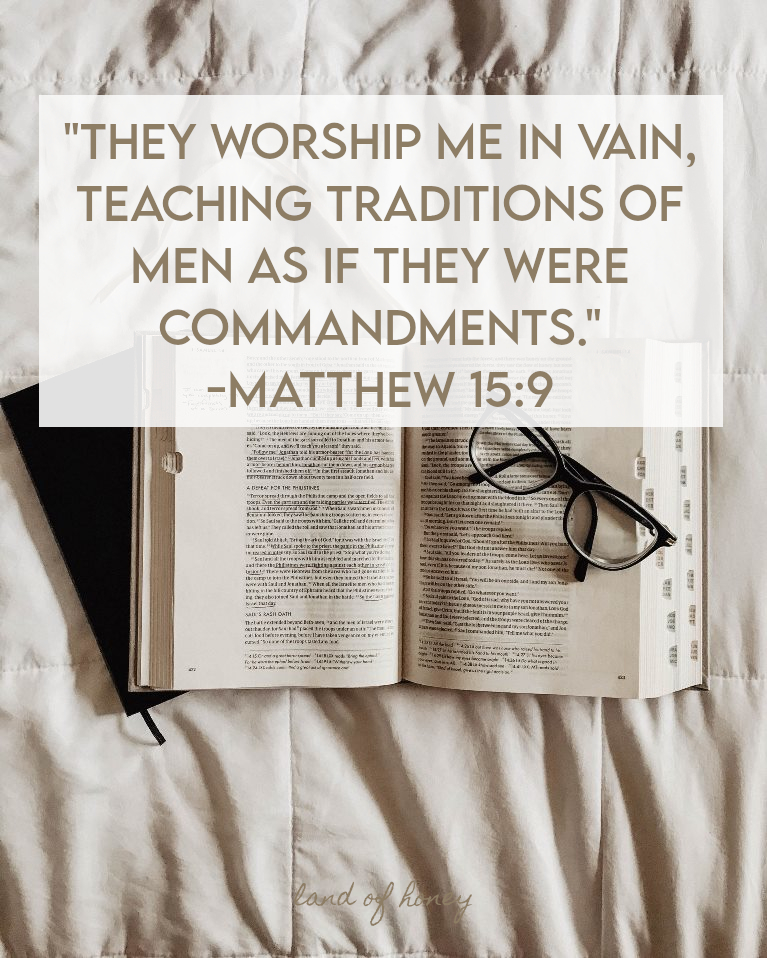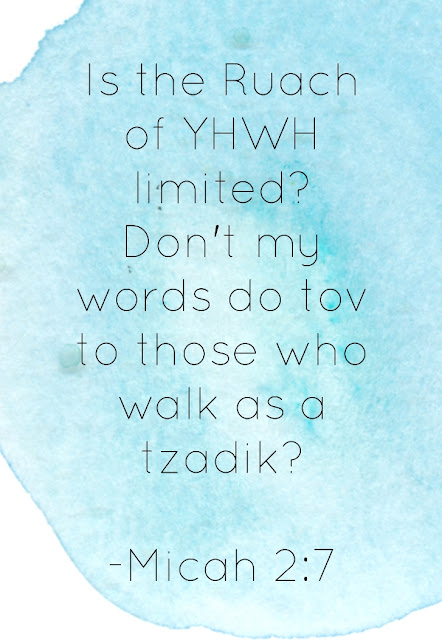Many of us who have wound up in the Messianic or Hebrew faith movements have been quick to point out to family and friends many of the unbiblical customs that are prevalent in the Christian church. I have done this myself, pointing out that Christmas is not in the Bible. But if someone asked me if I celebrated Hanukkah I would say yes, and make the argument that that was okay since it was "Biblically based." Talk about confusing! It is a poor testimony when we criticize others for participating in traditions and customs that are not found in the Bible, while we participate in different traditions and customs that are also not found in the Bible.
It can also be incredibly confusing for others to hear me say things like, "I just do what the Bible says," while doing quite a few things that are not even suggested in Scripture, let alone commanded...and what's worse is if I act like doing those things makes my faith more sincere than theirs.
Now, tradition is not always bad, and not all cultural customs are wrong. My point is not to condemn anyone who has participated in these things, but to shed more light onto what is and is not in the Bible. It is important that we know the difference between what is a commandment from YHWH given to us in Scripture, and what is simply a manmade tradition or cultural custom. This post is to point out a few of these unbiblical customs that are frequently seen in the Messianic movement; it is not a conclusive list.
Messianic customs that are not Biblical:
-Davidic dancing. This is the circular dance you might see a group of people participating in during worship at a Messianic congregation. While Scripture tells us that David danced in worship, it never suggests he did so in a circle. The similarity between Davidic dance and the maypole dance should give us pause. The maypole dance is a fertility ritual that is significant to Wiccans. I'm not saying those who participate in Davidic dancing have any intentions other than to honor YHWH, but you should know that other religions do very similar dances.
-Hanukkah and Purim. Yes, these are both mentioned briefly in the Bible (Hanukkah in John, and Purim in Esther), but nowhere does the Bible give us a command to participate in either, as it does in Leviticus 23 for the set apart times of YHWH. It is simply wrong to treat these like they are the same as the holidays that YHWH created and commanded us to celebrate. It seems hypocritical to tell others that it's not okay to celebrate a manmade holiday based on the events of Luke 2, only to turn around and celebrate a manmade holiday based off the events of Esther.
-Prayer shawls. I've visited congregations where these are so prevalent they might as well be the official uniform of that ministry, but there is simply no Biblical command or precedent for prayer shawls. While there's nothing wrong with wearing a shawl, consider why you are taking part of this. Wearing a prayer shawl does not make you any closer to YHWH.
-Star of David. This six pointed star gets slapped on everything from jewelry to ministry logos to menorahs...and never once does the Bible say this is a symbol we should be using. I recommend taking a look at this video before incorporating this star into your wardrobe or decorating your home or meeting place with one.
-Shabbat candles. Did you know the Bible does not command us to light candles to usher in the Sabbath days? Did you know there's not even a reference to a Biblical character ever doing this? It's simply wrong to teach or say that you need to light candles in order to properly observe the Sabbath.
If these things are prevalent in your home or congregation, consider the message that sends to visitors. Many Torah keepers use phrases like, "We do Bible things in Bible ways." If you hear that while you're surrounded by people in prayer shawls or dancing in a circle, in a building that's decorated with stars of David, it sends the message that those are Bible things when they are not.
Let's be clear about our faith practices and make a distinction between Biblical commandments and manmade traditions. Please don't imply or say that believers need to participate in customs or rituals that are not found in Scripture.
Related posts:
The Seven Branch Menorah
Why Hanukkah is Not a Biblical Holiday
Commandments or Traditions - Understanding the New Testament





















.JPG)